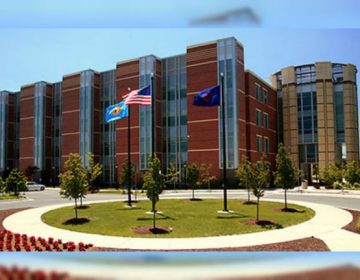University of Delaware breaks ground on biopharmaceutical research center
The facility, to be located on UD’s STAR campus, will house the national headquarters for the National Institute for Innovation in Manufacturing Biopharmaceuticals,

University of Delaware leaders join other dignitaries in the ceremonial groundbreaking for UD's new Biopharmaceutical Innovation Building. (Zoë Read/WHYY)
University of Delaware officials say they want the institution to be a leader of the biopharmaceutical industry in the United States.
On Monday, the university in Newark broke ground for what will become a six-story, 200,000 square foot Biopharmaceutical Innovation Building.
The facility, to be located on UD’s STAR campus, will be a hub for researchers to advance the biopharmaceutical industry and for students in the field to learn from experts.
The building also will house the national headquarters for the National Institute for Innovation in Manufacturing Biopharmaceuticals, where stakeholders will develop technology for advanced medicine.
“We have been quietly incubating a new initiative to compliment what we already have at STAR and move us along in a bold new direction,” said university president Dennis Assanis.

“We believe the University of Delaware and the state of Delaware can become a leader in the emerging field of biopharmaceuticals. It has the potential to cure the most vexing diseases, autoimmune diseases, Parkinson’s, Alzheimer’s, diabetes, cancer and more.”
For the first time in the university’s history, it is using debt financing for the $156 million dollar facility, expected to open in 2020.
NIIMBL is funded by a $70 million cooperative agreement from the National Institutes Standards and Technology, as well as more than $180 million in funding commitments from states, private industry and academic partners.
The institute is a collection of stakeholders that aim to innovate manufacturing and medicine, with a focus on treatments that are more complicated to manufacture—such as vaccines, proteins, antibodies, as well as cell and gene therapies that treat cancer.
“So what we’re trying to do is bring together all the relevant stakeholder groups to address some of the technology challenges the industry broadly faces that hinders the timeline from discovery of a medicine to when its available to a patient,” said Kelvin Lee, director of NIIMBL.
“We think by innovating that set of technologies we can shorten that timeline and enhance patient access to medicines, and at the same time we’ll work on training the workforce to be better prepared to be able to manufacture these medicines, so as future developments in growth and manufacturing facilities go up we’ll have that capability here in the United States.”
Assanis said the facility also will create opportunities for undergraduate, graduate and post-doc students to collaborate on projects. He said he also hopes startups will be created, and various companies will begin to populate the STAR campus.
The new facility also will provide the university an opportunity to integrate its main campus with the STAR campus, Assanis said.
“We have many people in other departments, biomedical engineering, chemistry, biology, biochemistry, when you put them all together under one roof that’s the catalyst,” he said. “Imagine the power of bringing people together to work on innovating our state’s future and children’s future and for better health outcomes.”
WHYY is your source for fact-based, in-depth journalism and information. As a nonprofit organization, we rely on financial support from readers like you. Please give today.





